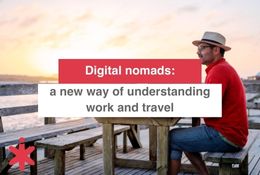Digital nomads: a new way of understanding work and travel
Digital nomads: a new way of understanding work and travel

Journalism or influencers: the means of inspiration for travelers
12/04/2023
The revaluation of a destination through the creation of new tourist attractions
23/05/2023Digital nomads: a new way of understanding work and travel

A digital nomad is defined as a person who, thanks to the use of the Internet, works remotely from anywhere on the planet. It is a lifestyle that allows professional development with greater flexibility of schedules and geographical freedom, as pointed out by specialized websites such as Planet Nomad.

The main driver of this trend was the pandemic: a situation that allowed, on one hand, the development of remote work beyond the technology sector and, on the other hand, the increase of people able to adapt to this new lifestyle. According to the latest data from World Economic Forum, it is estimated that there are about 35 million digital nomads.
What characterizes a digital nomad?
The needs of this community are different from those of regular tourists, starting with the most basic of requirements, their visa. For digital nomads to be able to telework and enjoy a destination for a long time, they need to have a specific visa. In this way, destinations that have this type of permit have more facilities to attract this segment.
Outside of this legal permission, this segment also makes its travel decisions according to the quality of the internet connection, the availability of coworking spaces to be able to work comfortably and the possibility of booking extended stays in accommodation or shared housing.

Of course, they also have some interests in common with most tourists, such as finding sunny, safe destinations where they can interact with the local population and culture.
The value of community for this new type of traveler
With the remarkable growth of this segment, communities of nomads have been created all over the world. These communities represent a meeting point for these people, where they can relate, network and create events. In this way, they manage to overcome the independence and loneliness that this lifestyle brings. The existence of international communities is vital for nomads to move to new places.
From the virtual point of view, Discord, Slack, Facebook groups and LinkedIn are the social networks most used by digital nomads, since they serve to create a feeling of belonging to the group and commitment.
Traveller communities help telecommuters network and have a big say in making decisions about which destinations to move to. An example of this is the Nomad List platform, where numerous remote workers share reviews and useful information about the destinations where they have been.
Nomad List, like Facebook groups and other communities on the network, makes resources available to the remote worker such as real opinions, experiences and contacts of great value to them.
Digital nomads in Spain
Spain has been able to recognize the potential of this segment. After a legislative process, it has managed to approve the Startup Law and offer a special visa for teleworkers. According to the information collected in El Economista, these measures will allow you to reside within Spanish territory for a full year and request visa renewal so you may reside in the country for up to five years. Tax advantages are also a factor that attracts many nomads to Spain.
In this way, Spain may manage to catch up with other destinations in the European Union, the region that offers the most visas to digital nomads, according to Statista data.

Autonomous communities such as Costa del Sol are also investing their efforts in attracting digital nomads. This destination meets many of the requirements that this niche group of tourists seek when deciding on a place to move, such as its beaches, weather, flight connections from Malaga airport, and now, the specific visa for digital nomads.
To attract these types of tourists effectively, Costa del Sol is working on enhancing its image as a technological destination, thanks to the development of its hub known as the Technology Park of Andalusia. In addition, promotional actions lead the destination to participate in tourism fairs such as the ITB held in March 2023, where the objective was the German digital nomad.
Future of this trend
The advancement of this lifestyle confirms that it will soon become a profession itself, normalizing in the professional world and tourism. For this reason, agents in the tourism sector agree that digital nomads are an opportunity to boost the recovery of tourism. This fact affirms the need to adapt the offer to a new segment of tourists who are much more technological and independent.
Andrea Molino
Marketing Team


 All the news
All the news  Back to newsroom
Back to newsroom

